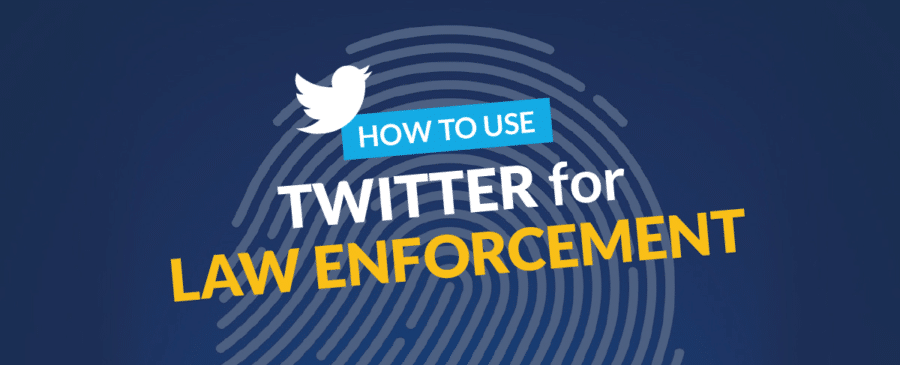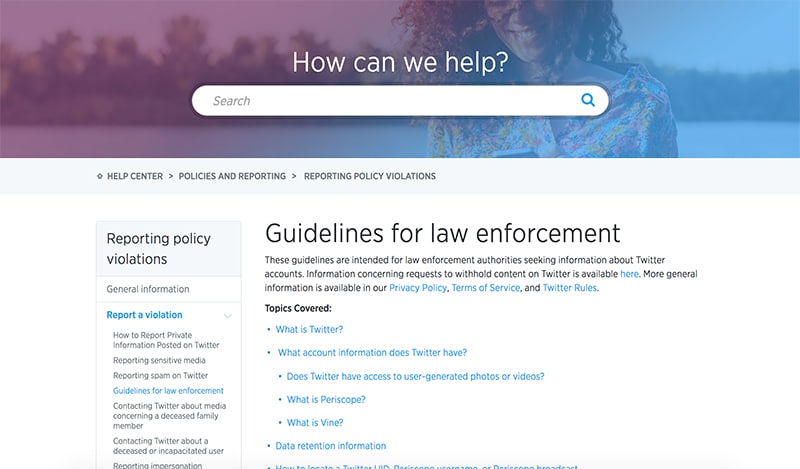Understanding How To Use Twitter For Law Enforcement

 The age of social media doesn’t stop with criminal investigations. As channels like Facebook and Twitter have become a near-ubiquitous communication mechanisms for audiences across demographics, they have also become valuable tools for law enforcement.
The age of social media doesn’t stop with criminal investigations. As channels like Facebook and Twitter have become a near-ubiquitous communication mechanisms for audiences across demographics, they have also become valuable tools for law enforcement.
Suspects, witnesses, and even general stakeholders use these social networks to communicate with and about each other every minute of the day. So increasingly, law enforcement departments and offices are leveraging the same channels to aid both their investigations and their public relations practices. Twitter especially has become a common tool for both efforts.
Find out how police forces are using social media for crime investigation, public relations and community engagement. Get JSB’s book here.
Twitter and Facebook have become valuable tools for law enforcement. Click To Tweet
Twitter as an Investigative Tool
Naturally, especially criminal investigations have to include as much data as possible. The average U.S. adult is expected to spend more than 5 years during their lifetime on social media using current usage rates. A communication channel with this significant of a time commitment necessarily needs to be included in any type of investigation.
Reality, however, is not always that simple. Due to privacy concerns, social networks have long been hesitant to give out their user data. Twitter is an especially difficult tool to take advantage of, thanks at least partially to its relatively lax community standards and the lack of information users need to provide in order to create an account.
Nevertheless, it has become a significant tool in a number of criminal investigations. A number of case studies and examples showcase the potential power of including this communication channel in your efforts. It can only be successful, of course, if you follow a number of best practices.

Source: digitaltrends.com
Following Best Practices in Requesting Private Data
To ensure a balance between the privacy of its users and the need for better investigations, Twitter has established a number of guidelines for law enforcement officers and departments seeking to use information from the network in their work. These guidelines, in turn, allow us to extrapolate some best practices when it comes to using Twitter as part of your investigation:
- Know which data you can request. In its law enforcement guidelines, Twitter is very clear about which data it owns, and which it cannot give out. An understanding of the limitations can help streamline and focus your investigation.
- Understand the potential of preservation requests. Some of the information stored by the network is deleted shortly after it first goes life. To prevent this real-time nature of Twitter to impede an investigation, the network allows law enforcement to preserve certain records beyond their expiration date.
- Understand the necessary documentation for request. As Twitter clarifies, requesting any private information requires a subpoena. Requesting communication itself, such as Tweets and direct messages, requires a search warrant.
- Keep the user in mind. This FAQ page for legal requests allows law enforcement to better understand how Twitter seeks to protect its user data. It can be vital in guiding your legal requests to ensure they remain within Twitter’s guidelines. It also helps to know that Twitter will notify users anytime their information is requested.

Source: twitter.com
Of course, these are just some of the many best practices law enforcement has to follow. The key is understanding Twitter’s law enforcement guidelines for a better understanding of where to start. You can, of course, also access public information without needing to go through these communication channels.
Fighting crime is becoming increasingly effective thanks to the targeted use of social media. Click To TweetBalancing the Need for Privacy With Better Law Enforcement
Twitter keeps user privacy in mind. The police needs information to be as transparent as possible. A balance of both of these potentially conflicting perspectives is crucial to a successful criminal investigation on the network.
To make that balance possible, it makes sense to understand exactly how far Twitter is willing to go to protect user privacy. The correct documentation, as mentioned above, is crucial. But the network also publishes regular transparency reports that help to ensure any user is aware of potential investigations.
Fighting crime is becoming increasingly effective thanks to the targeted use of social media. But only a well-informed and thorough approach can help to maximize your chances of a successful investigation. The other alternative might be a public relations nightmare – fortunately, the network provides a number of opportunities in this area, as well.
Twitter as a Public Relations Tool
If citizens increasingly rely on social media for their communication needs, the same medium can be a valuable communication tool for police departments. Here, they can share community efforts, ask for help in investigations, and place an emphasis on policing transparency.
As PoliceOne points out, the 2011 Boston Marathon bombing was a core example of how Twitter can be used to both protect the public and act as a public relations vehicle. After the bombing, the Boston Police’s Twitter account more than doubled in followers who were eager for updates and willing to help.

Source: sproutsocial.com
Of course, the possibilities don’t end there. Especially smaller police departments can use the medium to personalize their service, humanizing the police force and bridging gaps between offers and the population they’re sworn to serve. Across the United States, law enforcement is already using Twitter for these exact reasons.
How to Take Advantage of Twitter as a Law Enforcement Tool
Used correctly, Twitter can be an immensely valuable tool for law enforcement. From investigations to public relations, it can at once improve police work and improve community ties.
To get to that point, of course, you do have to gain a deeper understanding of how this social network actually functions, and how its users behave.
Used correctly, Twitter can be an immensely valuable tool for law enforcement. Click To TweetOur law enforcement social media courses can help you get started in that regard. For more information about this important topic, contact us.






